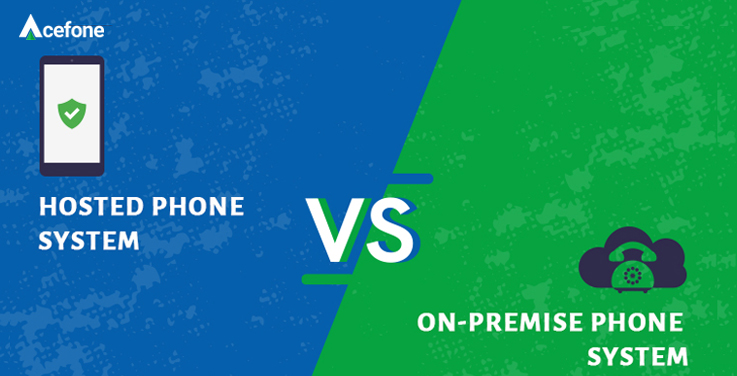The introduction of VoIP has changed the way businesses communicate. Statistics suggest small businesses that have switched to VoIP save 40% on local calls and 90% on international calls.
Choosing the right business phone can be a confusing task when there is a variety of business phones with various features available. We are going to discuss here two options hosted and on-premise phone systems.
Traditionally both were based on hard-wired PBX, but with the advancement in technology, they are now based on the internet, commonly known as IP PBX.
To avoid confusion, we are only focusing on the latest technology, which is the IP PBX. Both come with some pros and cons. In this blog, we will discuss their differences based on various factors. You can decide yourself which one suits your business needs.
What is a hosted phone system?
A hosted phone system or a hosted PBX is a cloud-based solution that uses the internet for communication. It is hosted by the service provider, somewhere else other than your office. It does not require space for hardware setup, it only needs an internet connection, computer, and headset.
The service provider remains responsible for its maintenance and software upgrades. They charge a monthly fee, which includes minutes and features chosen by you. The more features you add, the more you pay. It follows the pay-as-you-go model in which you pay only for the services that you use.
What is an on-premise phone?
As the name suggests, it is located at the office’s premises. You need a dedicated room for placing the required hardware. The hardware includes a physical box, which is used to switch the phone lines; all the handsets are connected to this box. You have all the control, and you are responsible for its maintenance and upgrades.
Hosted Vs. On-Premise
1. Cost
Hosted Phone
The initial setup cost is lower than on-premise as it does not require any additional equipment.
It includes maintenance and upgrades cost in its monthly fees. Therefore, you can predict or estimate your monthly charges. The monthly fee is charged on the number of phone lines and features added.
On-Premise
It is like a one-time investment of hardware and services; thus, the initial cost of set up is very high.
However, you need to replace hardware once it begins to wear out or when there is an upgrade in technology. It also requires the hiring of IT specialists for its maintenance, which adds up to the initial cost of setup.
2. Scalability
Hosted Phone
The addition and removal of the phone system are much simpler than on-premise. It is so easy that you can add or remove users by following the instructions.
It is best suitable for a fluctuating or a seasonal business because it is very easy to scale up or down when required. The hosted phone follows the pay-as-you-go model, which ensures that you are paying only for the services that you are using.
On-Premise
Scalability in an on-premise phone solution is difficult to achieve as it
Includes additional hardware and complex cabling. It also requires you to hire a technician for the addition or removal of lines. This solution is best suitable for a business with a fixed number of users. Considering the growth of your business, you may need to purchase extra hardware in advance. Otherwise, you need to purchase an entirely new service again.
3. Mobility
Hosted Phone
With hosted phones, employees can be mobile. They can take calls from anywhere irrespective of their geographic location. All you need to do is transfer your calls from a hosted phone to your device. Mobility boosts the productivity of your employees by allowing them to work remotely.
On-Premise
Since on-Premise phones are located in the office, it does not offer remote access.
Although you can customise it to support remote access, for that, you require advanced equipment that charges more.
4. Security
Hosted Phone
Security is offered by your service provider. Hence, it is crucial to choose the right provider. Look for the provider that uses advanced security methods like encryption and two-step authentication to provide the best security possible.
On-Premise
You are responsible for the security of your data and phone system. It may offer better security as it is under your control. Thus, you can monitor and take desired security measures.
5. Reliability
Hosted Phone
Since data is stored in the cloud, it is safe during any natural disaster as it has a backup. Data
can be accessed anytime and from anywhere.
On-Premise
Data, if stored only in the office and with no backup, gets easily affected during any disaster. In such a case, any loss of data can’t be retrieved again.
6. Automatic Upgrade
Hosted Phone
Hosted phones are automatically updated by your service provider. You do not have to worry about its upgrade. The charges are already included in your monthly plan.
On-Premise
On-premise phone solution requires hardware upgrades from time to time. With improved technology, your hardware needs to be replaced, as it might not be useful then.
Conclusion
Hosted as well as on-premise phone systems are feature-rich. Features included are call transfer, call hold, voicemail to email, auto attendant, conference calls, and many more. The only main difference between the two is that in a hosted phone, you get rid of the hardware maintenance and upgrades.
It is fully managed by your service provider. You can save your time and invest in other high priority tasks. While in an on-premise solution, you will have to maintain plenty of hardware and physical lines.
Swastika Dhakal is working with the Digital Marketing team at Acefone. She is interested in technology and likes to write on it. She loves to explore historical places, as well.














